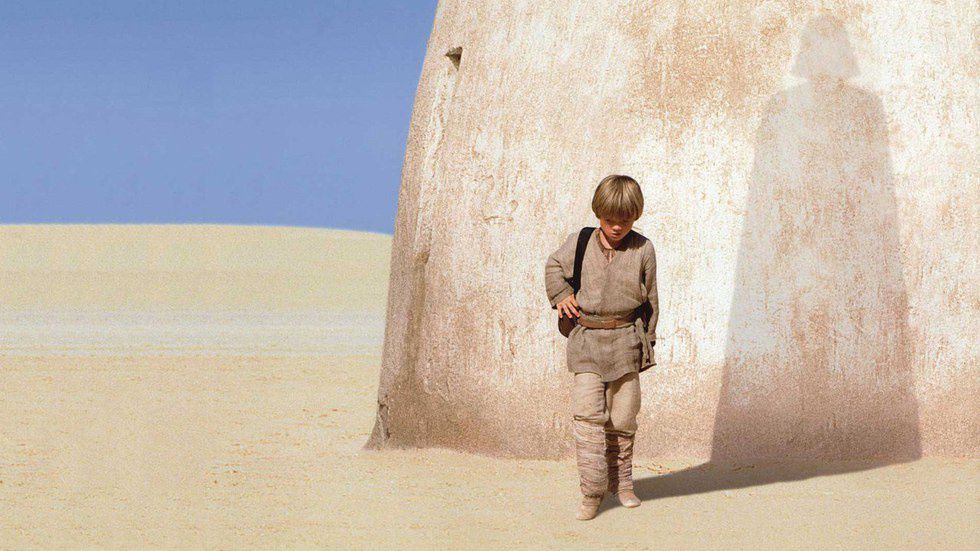The world is at an all time high right now. No other movie has been more hotly anticipated than "Star Wars: Episode VII - The Force Awakens," which is now less than two weeks away from its release on December 18. This heated air of anticipation, nostalgia and excitement among "Star Wars" fans has no doubt encouraged them to revisit the all of classic films that started the cultural phenomenon. Well, almost all of them. Many die-hard fans of the franchise angrily dismiss the much-maligned prequel trilogy ("Episode I - The Phantom Menace," "Episode II - Attack of the Clones" and "Episode III - Revenge of the Sith") in favor of the more critically-lauded original trilogy ("Episode IV - A New Hope," "Episode V - The Empire Strikes Back" and "Episode VI - Return of the Jedi"). The prequels, especially "Episode I," are considered some of the biggest letdowns in movie history due to their over-reliance on CGI, questionable acting, wooden dialogue, and weak direction from the saga's creator, George Lucas. In all actuality, this is what the fans who grew up with the original trilogy will lead you to believe.
I am here to dispel these pretenses and tell you that the "Star Wars" prequel trilogy is severely underrated. Firstly, I will admit I am somewhat biased since I grew up with the prequels and was easily fascinated by their visual splendor, but don't you think the same could be said for those who grew up with the originals? There are a great many fans who were practically raised on the originals, so it's understandable that their nostalgic feelings and expectations regarding what a "Star Wars" movie should be factored greatly into their judgment of the prequels. Simply put, these people dislike the prequel trilogy because it wasn't anything like the original trilogy in their eyes.
service. Rather than only recycle elements that made Episodes IV, V and VI so memorable, Lucas also sought to explore new themes and concepts that would further expand the "Star Wars" universe in Episodes I, II and III. I could probably go into more detail about this, but there are a few points that I believe are far more important to make in order to understand why the fan hate is undeserved.
The Visual Effects
While I do agree that some of the CGI does not hold up too well (particularly in Episodes I and II), there's a hard fact about the making of all six films fans should know. Since "Episode IV," Lucas and his special effects crew were always at the forefront of visual effects filmmaking. The hand-crafted effects of the original trilogy were the most advanced effects that could be achieved at the time, just as CGI was the most advanced effects tool at Lucas's disposal for the prequel trilogy. The complaints about the CGI looking cartoony in comparison to the more realistic man-made effects of the earlier films are kind of ridiculous if you ask me. "Star Wars" is a FANTASY! Of course some parts aren't going to look realistic! Films as imaginative at these should be entitled to a complete suspension of disbelief.
The Acting
Perhaps the most cringe-worthy aspect of the prequels for most fans are the wooden performances from the majority of the cast. First of all, when did a kids movie ever require believable acting? I could elaborate on this by focusing on certain actors (i.e. Hayden Christensen), but rather than do a lot of explaining, I urge you to go back to the originals and pay close attention to the acting. You may be surprised to find that no one in the cast gives a truly great performance at all. The only actors in the entire saga who truly stand out are Harrison Ford, Alec Guinness, Liam Neeson and Ewan McGregor. If anything, the actors really are not to blame, it's...
...The Dialogue
Lucas is well aware of the pompous dialogue and heavy exposition in his films. He has even jokingly referred to himself as the "king of wooden dialogue." As I said before in regards to the acting, are kids movies required to contain realistic dialogue? I distinctly remember being 10 years old, seeing "Episode III" for the first time and being transfixed by what was spoken throughout the film. Nowadays I realize that what is spoken throughout all the "Star Wars" films is pretty over-the-top, which brings me to my last (and most important) point.
An Epic Space Opera
Operatic storytelling is typically grandiose and over-the-top. The point of an opera is to exaggerate and romanticize the various themes and character emotions of its story. Some of the greatest examples of this form of storytelling can be found in mythology, which explores real-world concepts and beliefs through a fantastical lens. This is exactly what "Star Wars" is. The saga takes many cues from ancient mythology, philosophy and history, yet it simultaneously creates its own unique mythology. Therefore, visual and emotional realism should be the last thing on someone's mind while watching "Star Wars."
Many more arguments could be made in defense of the prequels, and believe it or not, even haters have managed to find aspects about them that are too difficult not to enjoy. On YouTube, there are a number of video essays that discuss redeemable elements in the trilogy, but I left the best one at the end of the article for you to watch. If I have compelled you enough to reconsider your possible disappointment with these films, I encourage you to watch all six episodes in chronological order. You may find that the prequels are not so terrible after all.





















